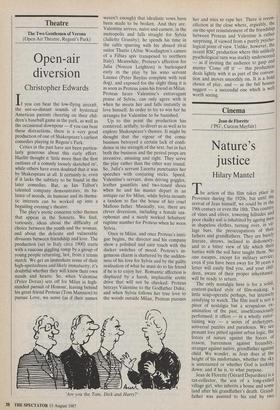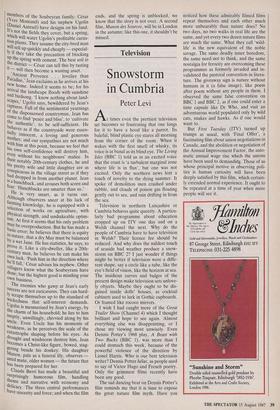Cinema
Jean de Florette (PG', Curzon Mayfair)
Nature's justice
Hilary Mantel
The action of this film takes place in Provence during the 1920s, but until the arrival of Jean himself, we could be in the 19th century or even the 18th. This country of vines and olives, towering hillsides and poor chalky soil is inhabited by ageing men in shapeless clothes, turning over, in vil- lage bars, the preoccupations of their fathers and grandfathers. They are barely literate, shrews, inclined to dishonesty, and to a bitter view of life which their battles with the soil have taught them. No one escapes, except for military service; even if you have been away for 30 years a letter will easily find you, and your chil- dren, aware of their proper inheritance, will be ready to return. The only nostalgia here is for a solid, content-packed style of film-making; a little soap-operatic perhaps, but intensely satisfying to watch. The film itself is not a piece of nostalgia but a scrupulous ex- amination of the past, unselfconsciously performed; it offers — in a wholly enter- taining way — a series of archetypes, universal puzzles and paradoxes. We see peasant lore pitted against urban logic, the forces of nature against the forces of reason, barrenness against fecundity, stranger against native, grandfather against child. We wonder, as Jean does at the height of his misfortunes, whether the sky is untenanted or whether God is looking down: and if he is, to what purpose.
Jean de Florette (Gerard Depardieu) is a tax-collector, the son of a long-exiled village girl, who inherits a house and some land after his grandfather's death. Grand- father was assisted to his end by two members of the Soubeyran family; Cesar (Yves Montand) and his nephew Ugolin (Daniel Auteuil) have designs on his land. It's not the fields they covet, but a spring, Which will water Ugolin's profitable carna- tion plants. They assume the city-bred man will sell up quickly and cheaply — especial- ly if they take the precaution of blocking UP the spring with cement. The best soil in the district — Cesar can tell this by tasting
— will then become a wasting asset.
Ancient Provence . . . lovelier than Paradise,' Jean exclaims as he arrives at his new home. Indeed it seems to be; for his arrival the landscape floods with sunshine and birdsong. 'I know nothing about land- scapes,' Ugolin says, bewildered by Jean's raptures. Full of the sentimental yearnings of the dispossessed countryman, Jean has come to find 'peace and bliss', to 'cultivate the authentic', to be self-sufficient. He behaves as if the countryside were essen- tially innocent, a loving and generous mother; and our sympathies are not much with him at this point, because we feel that his own self-confidence will destroy him, even without his neighbours' malice. In their notably 20th-century clothes, he and his pretty wife and little daughter are as conspicuous in the village street as if they had dropped in from another planet. Jean Is a hunchback, and arouses both scorn and fear: 'Hunchbacks are smarter than us.' He is very smart, as it turns out. Although observers sneer at his lack of farming knowledge, he is equipped with a selection of works on agriculture, with physical strength, and unshakeable optim- ism. At first it seems that his only problem may be overproduction. But he has made a basic error; he believes that there is equity In nature, that a dry May must be balanced by a wet June. He has statistics, he says, to Prove it. Like a city-dweller, like a 20th- century man, he believes he can make his own luck. 'Push him in the direction where he'll fall,' Cesar advises his nephew. Other villagers know what the Soubeyrans have done; but the highest good is minding your own business. The enemies who gawp at Jean's early success are not caricatures. They can hard- ly scrape themselves up to the standard of wickedness that self-interest demands. Ugolin is mesmerised by Jean's energy, by the charm of his household; he lies to him Ineptly, unwillingly, chivvied along by his uncle. Even Uncle has his moments of weakness, as he perceives the scale of the catastrophe shaping before his eyes. As drought and windstorm destroy him, Jean becomes a Christ-like figure, bowed, stag- gering beside his donkey. His daughter Manion, pale as a funeral lily, observes amid mute, older women — the future that has been prepared for her. Claude Berri has made a beautiful and surprisingly humorous film, handling theme and narrative with economy and delicacy. The three central performances have sincerity and force; and when the film ends, and the spring is unblocked, we know that the story is not over. A second film, Manon des Sources, will be in London in the autumn; like this one, it shouldn't be missed.



















































 Previous page
Previous page